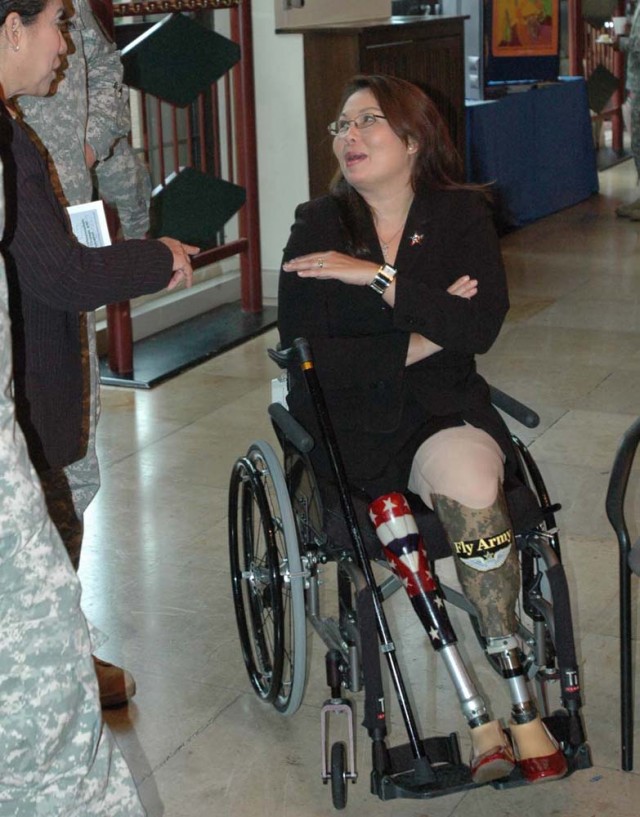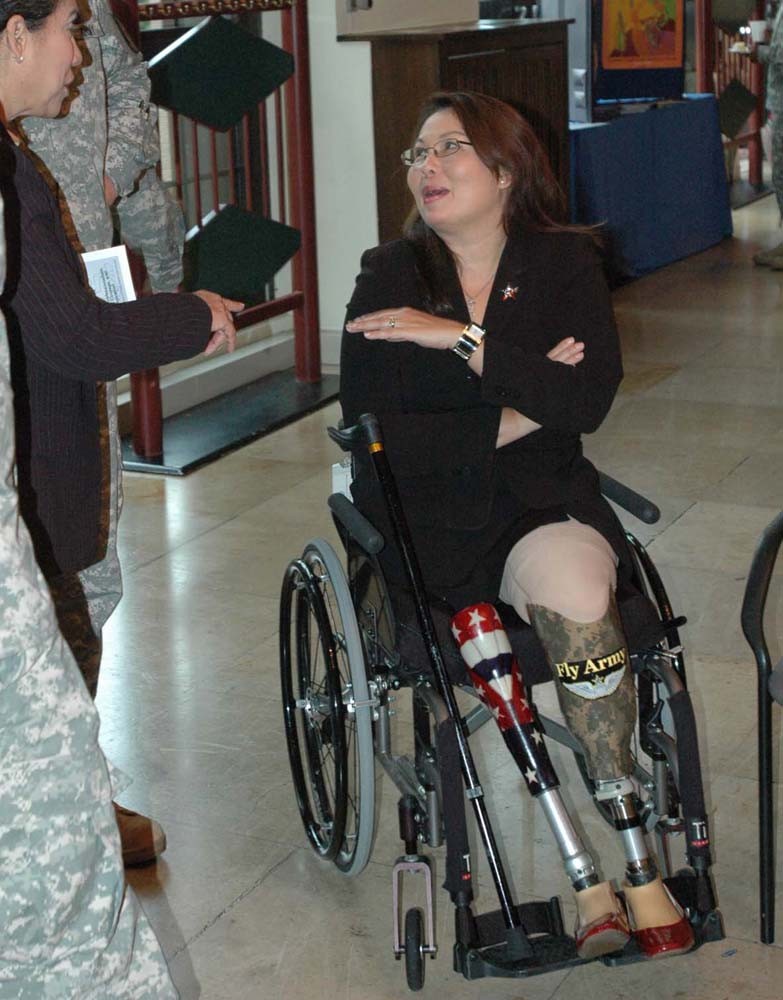HEIDELBERG, Germany -- Four years after a rocket propelled grenade "vaporized" her legs and left her right arm hanging by a thread of skin, Illinois National Guard Maj. Tammy Duckworth walked to the front of the Casablanca Room to share her story Oct. 16.
This, of course, came just a week after she completed a marathon in Chicago.
Duckworth is no longer a pilot, but she still serves in the National Guard and fights for her fellow service members as the director of the Illinois Department of Veterans' Affairs.
In her discussion as part of Heidelberg's National Disability Employment Awareness Month event, Duckworth says she went from wondering why there were so many handicapped parking spots outside her National Guard Armory - thinking, if Soldiers are handicapped, they don't belong in the Army - to now using those same parking spots.
The pilot nearly died when the RPG slammed into the Black Hawk cockpit in Iraq in November 2004. After somehow successfully landing the aircraft, while in and out of consciousness, her crew members thought she was dead, until one of them felt warm blood coming from her body and realized she was still alive.
The support she received from her crew that day in Iraq, and the subsequent care in the hospital and throughout her recovery, is what she feels is a strength of the Army.
"When I was recovering at Walter Reed, one of the first things that I remember was somebody telling me that 'you will fly again if that's what you want to do. You will do these things,' because the Army set these standards up for me," Duckworth said. "Nobody said that I would spend the rest of my life sitting in a corner in a wheelchair collecting unemployment and disability checks. Nobody said that, because the Army doesn't expect that of our wounded."
Duckworth pointed out that disabled veterans will have priority for civilian government jobs. She urged the crowd to make workplaces accessible now. "Understand what you may or may not need to do to accommodate someone with a disability," she said, "so that you are just that much further ahead of the curve when they do show up, so that you can maximize the skills that they have."
There are dual purposes for something such as a wheelchair ramp, she said.
For example, a wheelchair ramp helps not only those in wheelchairs, but also a mom with a stroller, or someone carrying large amounts of boxes in or out of a building. Or an elevator in addition to a staircase may not seem cost-efficient to add for one disabled employee, but when it is thought of as a greater benefit to everyone who works there, it makes more sense.
"It ends up being universally beneficial to everyone, so think about it in those terms," she said.
She also told the group that sometimes the best thing someone can do is talk to her. "The one thing that people with disabilities do ask is that, if you're curious, just ask," she said.
She has no problem with people asking her how she lost her legs, but does not appreciate it when people treat her differently or try to take their kids away in fear that they'll say something inappropriate.
"All you have to do is ask, 'what can we do to make your life a little bit easier'" she said. "It just takes a simple question, and that's all you have to do to be aware of someone with disabilities."
She told the crowd to remember that when people come onto installations, and see disabled family members out shopping or having a good time, it sets an example for the rest of the world.
After her stop in Heidelberg, Duckworth visited Landstuhl Regional Medical Center Friday to meet with staff and tour the hospital.
Duckworth ran for a U.S. Congressional seat in 2006 and has testified before Congress on issues of medical care for returning veterans. As a Soldier, she received the Purple Heart, the Air Medal and the Army Commendation Medal.
According to the U.S. Army Garrison Baden-WAfA1/4rttemberg Equal Employment Opportunity Officer Bonnie J. Ballard, it's hard to know exactly how many disabled veterans are now serving as civilians here, because many people don't identify their disabilities. They do have, however, 219 civilians or 25 percent of the workforce, as claiming disabled veterans preference.
Ballard said the importance of bringing Duckworth to speak to the community here stretches beyond just the disabled.
"We brought her over here to raise the awareness of the community," she said. "She is so much like America's individual - she is so talented, and by having her over here, it will give those with disabilities and those not disabled a new outlook on life.
"One thing I've always told people is 'just because you are walking today doesn't mean you'll be walking tomorrow,'" she said. "It's something we can't take for granted. "There's a thin line between those who are able-bodied and those who are disabled. I gained strength from (Duckworth) and hope everyone else gained the same thing."
The National Disability Employment Awareness Month event also included a panel of experts from the Heidelberg area, including Lt. Col. Raymond Gundry, U.S. Army Medical Activity, Heidelberg; Betty Koschig, Civilian Personnel Advisory Center; Bob Eastwood, Directorate of Public Works; and Helena Palmer, Exceptional Family Member Program coordinator.
Each panel member gave ideas on ways to improve workplaces for current disabled employees and those that may come in the future.
Palmer reminded everyone that the EFMP is not just a paperwork trail, and including disabled family members in plans and activities is just as important.
National Disability Employment Awareness Month is observed each year in October. This years' theme is "America's People ... America's Talent ... America's Strength."
(Editor's Note: Kristen Marquez writes for the USAG Baden-Wuerttemberg newspaper, the Herald Post.)


Social Sharing